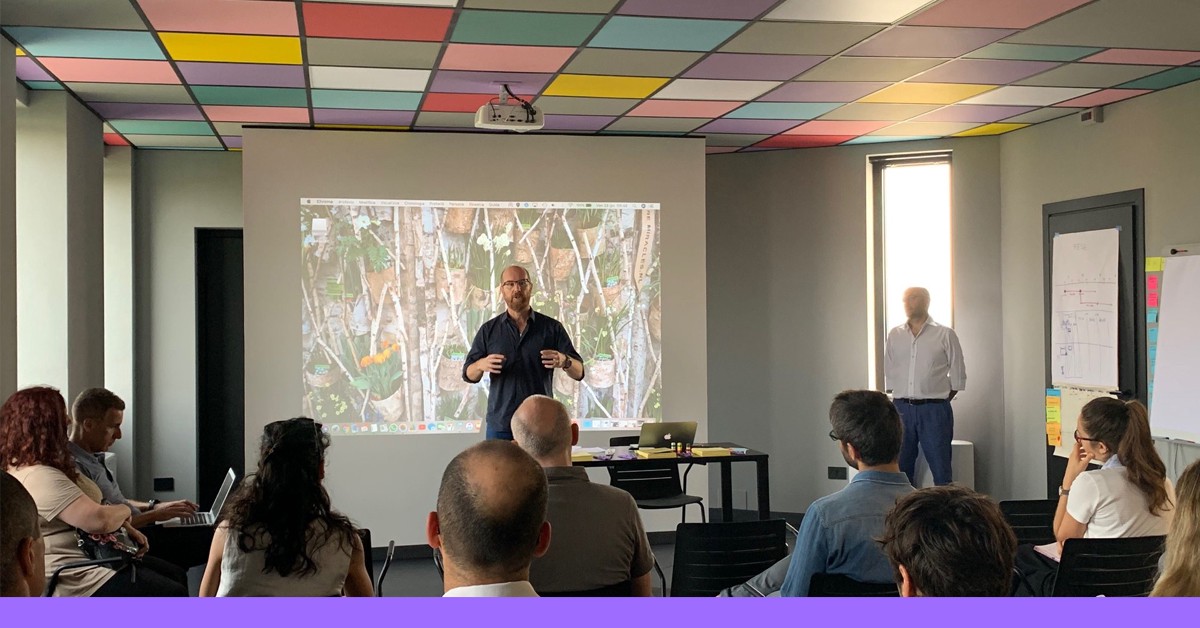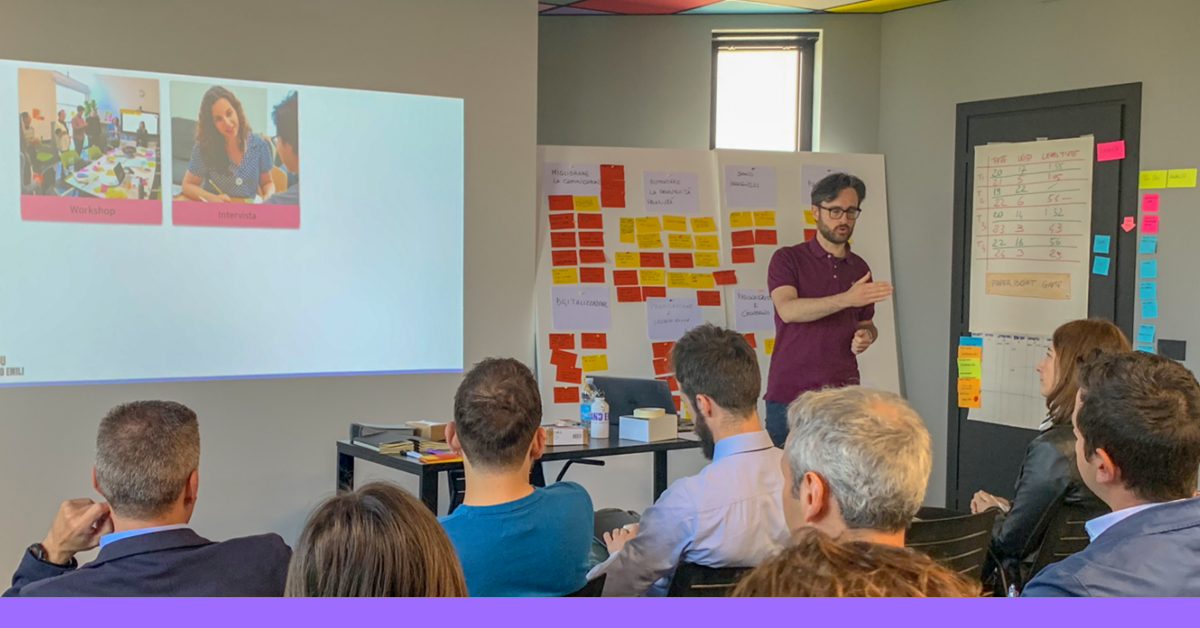Why opt for a workshop over a meeting
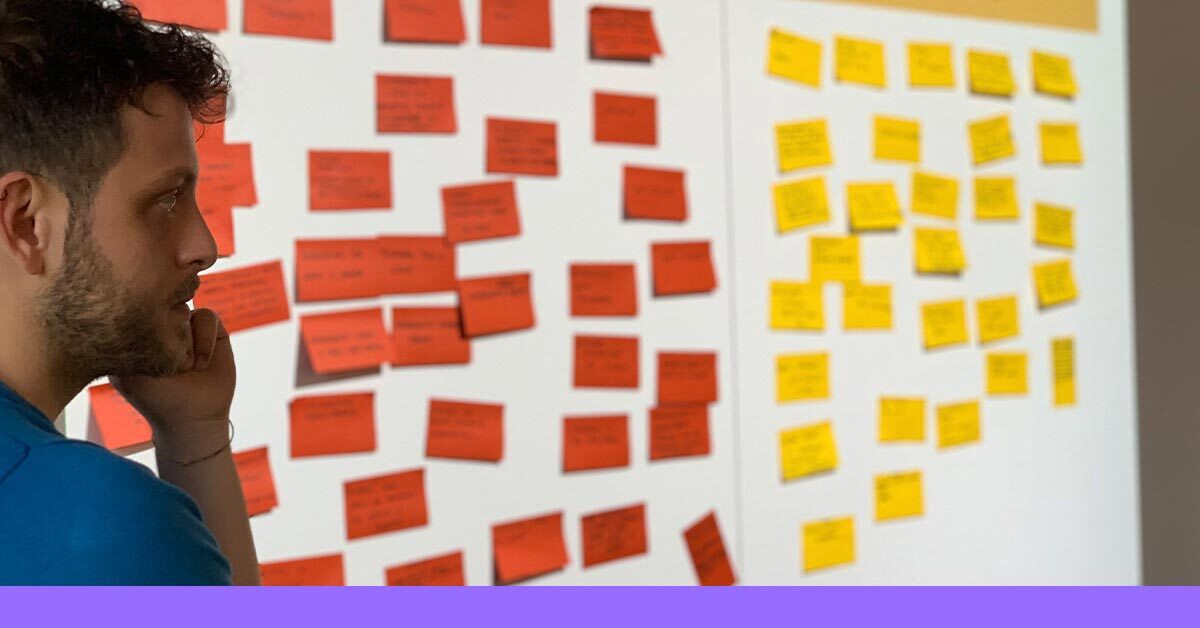
What is a workshop? Is it just another word for "meeting"? No: it represents an alternative to traditional company meetings, often a preferable one.
Company meetings: a necessary evil?
It's been known for years that companies hold too many meetings.
Some are necessary, but various studies indicate that many are redundant, unproductive, and demotivating for those involved. Worse yet, they consume time that could and should be dedicated to "real" work. For perspective on this issue, Harvard Business Review offers a benchmark article.
Why are meetings often pointless or even counterproductive?
Let's list some reasons:
- Some participants talk a lot, others little or not at all: subjective attitudes, fear of judgment, aversion/proclivity for confrontation, feeling more or less legitimate or competent in the discussion come into play.
- Voices are not equal: hierarchy, seniority, gender or other factors establish dominant voices, which others conform to (the so-called groupthink), while alternative contributions are ignored.
- The topics are broad and only superficially discussed: discussions might span an entire project or theme (e.g. the commercial strategy, the company website), or many different themes, failing to pinpoint and discuss specific aspects or problems.
- Contrasting opinions remain unbridged: some participants bring their views to the table without any intention of changing them, either defensively ("I told you so") or for personal or "political" agendas.
- Concrete actions are not identified: at the end, next steps to address the issues raised are not clearly defined, or it's unclear which problems are most urgent; often, resolution is deferred to subsequent meetings (hence the proliferation of meetings).
What distinguishes a workshop from a meeting?
A workshop comprises a series of coordinated group activities aimed at solving an initial question within a limited timeframe. Workshops are characterized by their focus on tangible results: creating shared visions, identifying the most pressing problems, devising potential solutions, and selecting the most promising ones.
These are some of the aspects that set workshops apart from traditional meetings:
- All participants contribute equally: differences in hierarchy, expertise, attitude towards discussion etc., are set aside. In fact, the diversity of viewpoints is considered a valuable resource, and cross-functional and interdisciplinary groups are preferred.
- It starts with a concrete question: from a specific problem, opportunity, data, or result. For example, not "the company website" but "why don't users sign up for our newsletter?", "who are our website's users based on the data we have?", "what don't we know about our users?"...
- A facilitator guides the participants through activities: explaining tasks and asking questions; managing time; not participating but ensuring others can contribute equally. The facilitator can be either internal or external to the organization.
- A workshop is aimed at identifying concrete actions: priorities, opportunities, next steps in a project's development, and who is responsible.
AND EMILI specializes in development and strategic consulting for digital channels.
Anatomy of a workshop
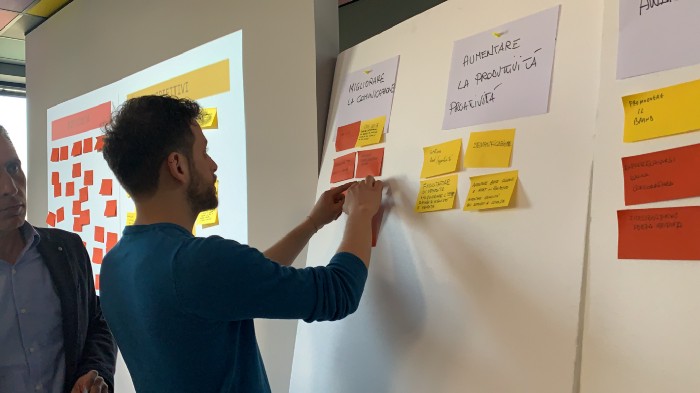
A workshop is a combination of individual and group activities, selected based on the goal and starting material (e.g., market data or results from a series of customer interviews).
The purposes of a workshop can include discovering opportunities or weaknesses, understanding user needs, ideating solutions, and prioritizing identified features and proposals.
Workshop activities utilize tools that allow participants to visualize ideas and concepts: typically, post-its, whiteboards, and markers, or their digital equivalents in remote workshops (e.g. Mural, Miro).
Usually, a workshop combines two or more of the following activities:
- Post-up: participants write their contributions (ideas, problems, questions) on post-its and attach them to a wall or whiteboard for the whole group to see.
- Sorting: contributions are grouped based on thematic affinities, and names are given to the identified groups.
- Storyboarding: contributions are organized along a timeline (e.g., customer journey) to construct a narrative.
- Drawings and sketches: participants draw their ideas in response to a problem or question (especially used during ideation workshops like Design Sprint or Design Studio).
- Voting: participants are given a number of votes (e.g., in the form of sticky dots or "money") to distribute among all contributions to identify the best or the most urgent.
- Matrices: contributions are organized on matrices formed by two or more dimensions (e.g. feasibility and user impact) to establish priorities, trends, or themes.
The benefits of conducting a workshop instead of a meeting
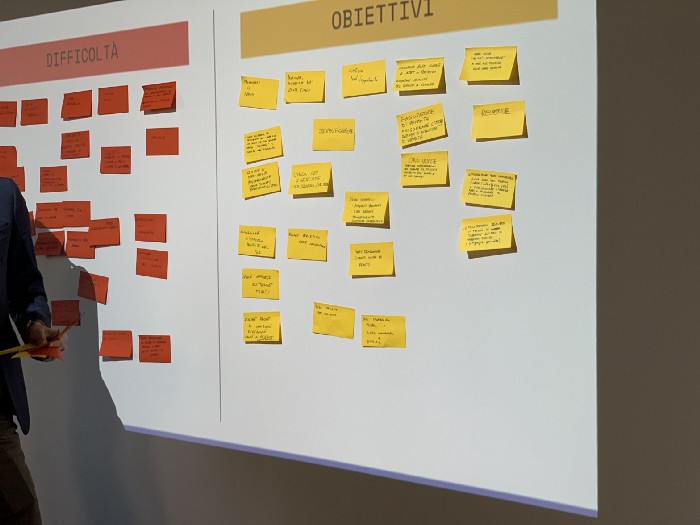
What, then, are the benefits of conducting a workshop instead of a meeting?
- Concrete outcomes: At the beginning of a workshop, questions or problems are posed, with the aim of reaching shared solutions or actions. Such actions must be tangible, not impersonal, vague, or abstract, and must be assignable to an individual or a department.
- Co-ownership of decisions: The ideas and decisions emerging from a workshop are shared by the entire group, with everyone feeling co-ownership because each has contributed by brainstorming, selecting, and voting according to their perspective.
- Interdepartmental alignment: It is advisable for representatives from various departments and business functions to participate in the workshop, ideally involving all those affected by the project under consideration. This approach facilitates rapid alignment and the sharing of goals, challenges, and next steps.
- Engagement: People feel more involved and heard in decision-making and are more motivated to carry forward the decisions made.
And the disadvantages?
You are now convinced to switch to workshops: from tomorrow, no more meetings! However, there are considerations to keep in mind, starting with the fact that simply saying "let's do a workshop" does not automatically lead to something effective. A workshop, unlike a meeting, cannot be improvised.
- Firstly, consider that a workshop requires more resources to set up: from analyzing the problem to formulating the appropriate question, from selecting activities to organizing spaces and materials.
- Conducting a workshop is more time-consuming: the minimum unit is half a day, and it can extend to several days depending on the needs and purpose.
- A workshop requires careful planning: time must be managed efficiently according to a tight and relatively rigid schedule, which must account for everything from the introduction of activities to breaks (essential to not drain the participants' attention and energy).
- For these reasons, a workshop requires an experienced facilitator, a professional figure responsible for planning and managing time and activities. The facilitator must also motivate and engage participants, ensuring at the same time that the discussion stays on track and that some participants do not hijack activities.
Is it worth it?
The answer is unequivocally yes, it is worth it.
Certainly, we should not think of replacing meetings entirely: in some cases, they remain the most sensible option, for example, at the beginning of a project or for quick alignments on the status of the project.
However, those who have experienced the advantages of workshops do not look back: direct experience makes the benefits clear, leaving a sense of overcoming obstacles and making tangible progress on projects. People draw energy and motivation from workshops, and barriers between departments are lowered to expedite decisions and actions more swiftly.
Have we piqued your interest? If you're thinking about your next workshop, talk to us.
AND EMILI specializes in development and strategic consulting for digital channels.
This page has been translated using automated translation tools and artificial intelligence technologies. We strive to ensure that the content is accessible in multiple languages, but please be aware that the translation may not be perfect. If you have any doubts or need clarifications, please feel free to contact us.

